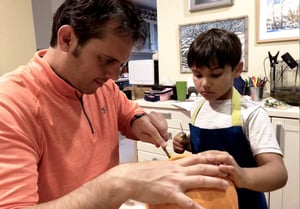There have been some narrow views of parenting shared by many cultures throughout history. One such notion suggests that mothers should be the nurturer and primary caregiver to children, while a father’s role in a child’s upbringing should be relegated to that of security and financial provider. However, as the centuries have progressed so too have the attitudes toward parenting and the very necessary role fatherhood plays in a child’s life.
 Research has shown just how important a father’s involvement is for a child’s overall well-being, citing higher IQ scores, fewer psychological issues and even lower rates of obesity, according to Fatherly.com. Though studies of fatherhood and the “Father Effect” are a relatively new undertaking, there are certain fatherly activities that have been proven to deliver lasting benefits to a child’s physical, emotional and cognitive growth.
Research has shown just how important a father’s involvement is for a child’s overall well-being, citing higher IQ scores, fewer psychological issues and even lower rates of obesity, according to Fatherly.com. Though studies of fatherhood and the “Father Effect” are a relatively new undertaking, there are certain fatherly activities that have been proven to deliver lasting benefits to a child’s physical, emotional and cognitive growth.
Strengthening Feelings of Security
Developing a sense of secure attachment from birth is essential to a child’s emotional development and to a child's abilities to form healthy relationships well into adulthood. Feeling secure allows young children to easily transition into new environments and to demonstrate greater comfort with changing situations. Loving, cuddling interactions that parents have with their child go a long way in helping a baby grow and develop into a successful person. Simply by holding, feeding or bathing his baby, a father is contributing to this valuable sense of security and establishing a loving bond that will help his child build meaningful life-long relationships.
Sharing Activities and Quality Time
As children grow older, another healthy way dads positively shape their little one’s social and emotional behavior is through rough and tumble play. Rolling on the floor, piggy back rides and games of tag—all the fun physical games dads naturally enjoy—are extremely beneficial to a young child’s physical and cognitive development. This play is encouraged for both sons and daughters and is especially important for establishing boundaries and impulse control.
 Sharing a hobby or engaging in a favorite pastime is another way fathers can connect and bond with their children. Golf, table tennis, fishing or any type of meaningful activity gives dads an opportunity to share their interests and their lives with their child. Not only is the child being exposed to life skills such as goal setting and problem solving, he or she is also developing a stronger, more valuable child-parent connection. Plus, what’s more important than the activity itself is the quality time father and child are spending together.
Sharing a hobby or engaging in a favorite pastime is another way fathers can connect and bond with their children. Golf, table tennis, fishing or any type of meaningful activity gives dads an opportunity to share their interests and their lives with their child. Not only is the child being exposed to life skills such as goal setting and problem solving, he or she is also developing a stronger, more valuable child-parent connection. Plus, what’s more important than the activity itself is the quality time father and child are spending together.
Maintaining Emotional Connections
All children are emotional beings who benefit greatly from parents, both mother and father, who are present, loving and approachable; therefore, strong parental connections are vital for a child’s healthy cognitive and emotional development. Mothers and fathers are children’s first and most important teachers; when parents intentionally share their love, time and feelings with their child, it is no surprise he or she is a happier and more well-adjusted individual from childhood through adulthood.
Contributors to this article include Concordia Pre-Kindergarten teachers Emily Hays, Adelina Johnson, Michelle Wee and Jennifer Shipley.




